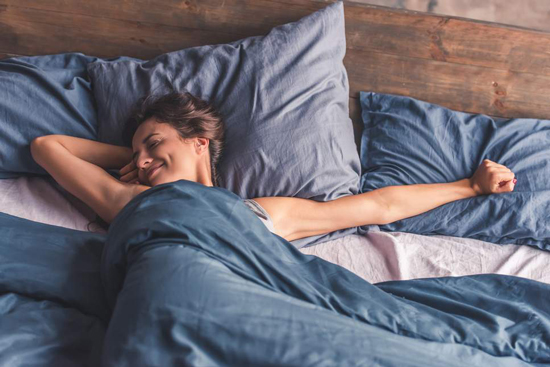Sleep Your Way to Better Health: Three Little-Known Sleep Hacks for Deep Rejuvenation and Rest

When it comes to fine-tuning and improving our health, most people focus on diet, nutrition, exercise and lifestyle habits like meditation and spending time in nature. However, something that is often overlooked or taken for granted that is equally important as any of these is the quality of our sleep.
The Unbelievable Amount of Time You Spend in Bed
This shouldn’t come as a surprise either. We spend one-third of our lives in bed: 229,961 hours on average to be exact. Anything that we spend that much time doing is going to have a major effect on our health. Compare the amount of time we sleep (229,961 hours) to how much time we spend eating (32,098 hours) and you can start to see just how influential it is.
People Who Sleep Better Are Healthier and Happier Than Those Who Don’t
People who get optimal amounts of quality sleep are happier, healthier, fitter, live longer, have better psychological health, stronger immune systems and have lower incidence of disease and illness. People who don’t get optimal amounts of quality sleep for whatever reason have exponentially higher levels of psychological disorders, report higher levels of fatigue and depression and are more prone to illness and disease than their sleep-nourished counterparts.
Suffice it to say that getting consistent, deep, restful sleep is essential for radiant health and wellness in life. So what are the keys to better health through better sleep?
Three Little-Known Sleep Hacks for Better Health, Deep Rejuvenation and Rest
Below you’ll find some unconventional sleep improvement tips that are easy to implement and extremely effective in helping you get a better night’s sleep.
1. Sleeping on a Cloud: The Single Most Overlooked Thing for Getting Incredible Sleep
If you have read a lot about sleep, you’ll know that most suggestions for sleeping better have to do with taking medicinal plants or supplements or adjusting your lifestyle, however, there is one thing that is often overlooked: the quality and comfort of your mattress.
How to Choose a Mattress That Makes You Sleep like a Baby
Here are three key takeaways for choosing a mattress that feels like sleeping on a cloud and that get you excited to hop in bed every night because they are so comfortable:
A. Make sure it is tailored to your desired level softness or firmness
There are literally hundreds of different types of mattresses to choose from these days and you can dial in the comfort level to your exact preferences so that you literally feel borderline-orgasmic when you hop into bed because it’s so comfortable. Good mattress companies will have in-depth explanations of how their mattresses feel and accommodating return/exchange policies to let you switch out the one you ordered if you end up not liking it after a few weeks so you can give it a real world test to make sure it checks all the right boxes for you.
B. Seek organic, all-natural, eco-friendly mattress out so you are not breathing chemicals as you sleep
Unfortunately many popular companies in the mattress industry are known for using low quality materials that are made from synthetic chemicals and harmful flame retardants that off-gas harmful volatile organic compounds (VOC’s) while you sleep, which means you can spend up to 229,961 hours breathing them in if you are on one of these mattresses! Suffice it to say this can have a major negative effect on your health.
Volatile Organic Compounds are extremely hazardous. According to the EPA, VOCs cause eye, nose and throat irritation, frequent headaches, nausea, and can also damage the liver, kidney and central nervous system. They can also disrupt your hormonal system, which controls your circadian rhythm (your sleep-wake cycles and levels of melatonin, the sleep-inducing hormone) and generally weaken your health which often leads to poor sleep.
Fortunately there are companies that are aware of the dangers these synthetic materials pose to our health and have worked hard to develop mattresses that do not off gas, are 100% free from VOCs and use organic, natural materials whenever possible. They carry a range of independent, third-party certifications and have a range of different mattress for all comfort levels and sleep types.

C. Make sure it is roomy enough for you to truly stretch out and relax – even with someone in bed
When it comes to mattresses, bigger is almost always better, especially if you sleep with someone. Bigger mattresses are more comfortable because they accommodate a greater range of sleeping positions and out stretching, which generally leads to more comfort. Humans are funny creatures in that we tend to adjust to and conform to our environment, meaning that if we have always slept in a bed that is too small, we get used to it and learn to live with it instead of seeking out something that truly makes us feel maximum comfort. The truth is that we move a lot during sleep and sleep issues like low back pain, sore joints and muscles are often due to cramped sleeping positions due to lack of proper space to stretch out and orient ourselves on a mattress.
A fidgety person with a different sleep schedule than us can also cause disturbances in our sleep and comfort. Bigger beds tend to absorb and isolate movement from sleep-over friends better which means you are less likely to notice or be bothered by what they are up to, leading to deeper, more restful sleep.
2. Get Your Hormones in Balance
Perhaps more than anything else, our delicate hormonal balance is responsible for the quality of our sleep. After all, melatonin, which regulates our sleep-wake cycles is a potent neurohormone. The way our hormonal system works is that imbalances in one area tend to affect all others because of the cascading nature of hormonal interactions. This is why women in menopause often have sleep issues – changes in estrogen levels lead to imbalances in other hormones and general body function, which can and does affect things like cortisol and melatonin levels, both of which dramatically affect our ability to fall and stay asleep. As such, maintaining a healthy hormonal balance is key to getting quality sleep.
While balancing hormones can be a complex topic, there are some fairly easy things you can do to help things along:
– Get regular light-moderate amounts of exercise 3 to 4 times per week, even daily if possible;
– Eat a wide spectrum of foods from all food groups with abundant healthy fats (i.e. olive oil, coconut oil, ghee and other unrefined oils) ideally organic and unprocessed;
– Make sure to get plenty of sun during the day on your bare skin and/or supplement with vitamin D in areas with low sunshine (vitamin D is important for proper hormone levels and balance).
3. Meditate, Meditate, Meditate
Practicing meditation regularly is one of the most powerful things you can do to improve the quality and length of sleep you enjoy. It’s widely known that one of meditation’s main benefits is a reduction in stress, which is one of the biggest contributing factors in lack of sleep and poor quality sleep. Moreover, meditation also activates parts of the brain associated with relaxation and rest and deactivates areas associated with stress. For instance, one study on meditation and stress showed that the amygdala, the area of the brain associated with stress and the flight-or-fight reflex, shrunk after just eight weeks. In this particular study, participants took part in a weekly Mindfulness-Based Stress Reduction (MBSR) course and meditated at home for an average of about 30 minutes a day.
In one study on mindfulness and sleep, researchers split adults into two groups – one that received sleep-education training and one that received training on mindfulness practices. After two hours of training a day for six weeks, those in the mindfulness group experienced better quality of sleep than those in the sleep education group. Various forms of mindfulness meditation, from MBSR to loving kindness meditation to simple mindfulness exercises, have shown effective results in promoting restful sleep, reducing fatigue and insomnia, and even lowering symptoms of depression. However, one important thing to keep in mind is that the key to seeing results with a meditation or mindfulness practice is to practice consistently. Even as little as 20 minutes a day can have noticeable and lasting benefits on your sleep patterns.
yogaesoteric
September 21, 2018
